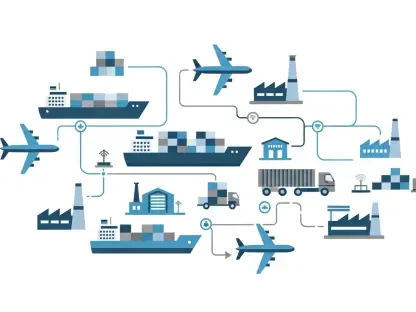The pharmaceutical industry is undergoing a significant transformation driven by rapid technological advancements. The logistics sector, a critical component of the pharmaceutical supply chain, is at the forefront of this digital revolution. Technologies such as Blockchain, the Internet of Things (IoT), and Artificial Intelligence (AI) are being utilized to enhance operational efficiency, ensure product integrity, and improve patient outcomes. As the pharma industry navigates this complex but promising landscape, the primary goal is to increase efficiency while ensuring stringent compliance and safety standards are met.
The Need for Digital Transformation
Pharma logistics faces unique challenges, including stringent regulatory compliance, cold chain management, and the necessity for end-to-end visibility. Traditional logistics methods often fall short of meeting these demands, leading to inefficiencies, increased costs, and risks related to product quality and safety. Digital transformation addresses these issues by offering innovative solutions that facilitate better tracking, reduce fraud, and streamline operations.
Several factors are driving the shift towards digital transformation in pharma logistics. Regulatory compliance is a significant driver, with frameworks such as the Drug Supply Chain Security Act (DSCSA) and the European Falsified Medicines Directive (FMD) necessitating robust tracking and tracing of products. Digital technologies help ensure compliance by automating processes and providing real-time visibility into the supply chain. Patient safety is another critical factor. The complexity of drug formulations and distribution channels has heightened the importance of patient safety. Digital transformation enables better tracking of medications, reducing the risk of counterfeit drugs and ensuring that products are stored and transported under the correct conditions.
Blockchain Technology in Pharma Logistics
Blockchain technology is revolutionizing pharma logistics by offering a decentralized and secure way to track products throughout the supply chain. One of the key benefits of blockchain is enhanced traceability. Blockchain provides an immutable ledger recording every transaction involving a pharmaceutical product, ensuring stakeholders can trace the origin of products and verify their authenticity. Fraud prevention is another significant advantage. The transparency and security offered by blockchain reduce the risk of counterfeit drugs entering the supply chain, thereby protecting patients and maintaining brand integrity.
Additionally, smart contracts on blockchain can automate various logistics processes, reducing paperwork and minimizing human error. Blockchain technology also streamlines documentation. By automating documentation processes, blockchain reduces the administrative burden on pharmaceutical companies, allowing them to focus on more strategic tasks. This increased efficiency can lead to cost savings and improved operational performance. The adoption of blockchain offers a promising avenue for mitigating risks and ensuring the safe delivery of pharmaceutical products.
Internet of Things (IoT) Enhancing Visibility
IoT technology enhances visibility and control over pharma logistics operations. Real-time monitoring is a crucial application of IoT in this sector. IoT devices can monitor temperature, humidity, and other environmental conditions during transportation and storage, essential for temperature-sensitive products like vaccines and biologics. Predictive analytics is another significant benefit of IoT. IoT devices collect vast amounts of data that can be analyzed to predict demand patterns, optimize inventory levels, and improve delivery routes. This leads to more efficient operations and reduced costs, benefiting both pharmaceutical companies and patients.
Asset tracking is also improved with IoT-enabled tracking devices. These devices provide real-time information on the location of pharmaceutical products, improving visibility and reducing the risk of lost or misplaced shipments. This enhanced tracking capability ensures that products reach their intended destinations safely and on time. IoT’s ability to offer real-time insights and predictive analytics provides pharmaceutical companies with the tools to optimize and streamline their logistics operations effectively, ensuring compliance and safety are always maintained.
Artificial Intelligence (AI) Transforming Decision-Making
AI is transforming decision-making processes in pharma logistics. One of the primary applications of AI is data analysis. AI can analyze large datasets from various sources, providing insights that help companies make informed decisions about inventory management, demand forecasting, and supply chain optimization. Process automation is another significant benefit of AI. AI-driven automation streamlines repetitive tasks such as order processing and inventory management, freeing up human resources for more strategic roles. This increased efficiency can lead to cost savings and improved operational performance.
Risk management is also enhanced by AI. AI can identify potential disruptions in the supply chain by analyzing historical data and current trends, allowing companies to proactively address issues before they escalate. This proactive approach can prevent costly delays and ensure that patients receive their medications on time. The transformative power of AI lies in its ability to process vast amounts of data and provide actionable insights, helping pharmaceutical companies make more informed and strategic decisions, bolstering efficiency and reliability across logistics operations.
Challenges in Implementing Digital Transformation
While the benefits of digital transformation in pharma logistics are significant, several challenges remain. Data security is a primary concern. Increased digitization brings the risk of data breaches, necessitating robust cybersecurity measures to protect sensitive information. Integration with legacy systems is another challenge. Many pharmaceutical companies still rely on outdated systems. Integrating new technologies with these legacy systems can be complex and costly. Companies must carefully plan and execute these integrations to ensure a smooth transition.
Regulatory compliance is also a challenge. As digital technologies evolve, so do regulations. Staying compliant with changing laws and standards is a daunting task for companies. They must continuously monitor regulatory changes and adapt their processes accordingly. The skill gap is another significant challenge. The successful implementation of digital technologies requires skilled personnel. The pharmaceutical industry must invest in training and development to bridge this skills gap. This investment in human capital is essential for the successful adoption of digital technologies. Overcoming these challenges is crucial for realizing the full potential of digital transformation, paving the way for a more resilient and efficient pharma logistics sector.
Conclusion
The pharmaceutical industry is experiencing a significant transformation due to rapid technological advancements. The logistics sector, a vital part of the pharmaceutical supply chain, is playing a key role in this digital revolution. Emerging technologies like Blockchain, the Internet of Things (IoT), and Artificial Intelligence (AI) are being leveraged to boost operational efficiency, safeguard product integrity, and enhance patient outcomes. Blockchain ensures secure and transparent transactions, IoT provides real-time tracking and monitoring, and AI offers predictive analytics and improved decision-making. These technologies collectively optimize the supply chain, from production to delivery. While navigating this intricate but promising landscape, the primary objective is to increase efficiency while adhering to strict compliance and safety standards. This ensures that the pharmaceutical industry can meet regulatory demands, maintain high-quality standards, and ultimately deliver better healthcare solutions to patients.









